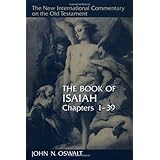
Average Reviews:

(More customer reviews)I enjoyed Oswalt's commentary on Isaiah 1-39 while leading a Bible study on it. It's the most comprehensive conservative evangelical commentary, much better than its predecessor in the series by E.J. Young. I share more theologically with Young and Alec Motyer's commentary, but Oswalt is balanced most of the time and presents so much more information that I wouldn't want to use either of the others without his.
Some mainstream commentators complain that Oswalt doesn't interact enough with contemporary Isaiah scholarship. His introduction argues for Isaian authorship of the whole book, with stronger arguments for the unity of the book than for Isaian authorship. The general argument for the orthodox position among scholars is circular in addition to assuming naturalism, so I agree with Oswalt's conclusion. I appreciate his arguments for this view, but his critics are right that he hasn't comprehensively dealt with everything the other side says. His introduction could have spent more time on such things.
In the commentary proper, he sometimes refers to others' views on authorship, and he might give quick versions of his arguments against them, but it would get too annoying to do too much of this. I can understand why he decided to make this a commentary on Isaiah rather than a comprehensive reply to modern scholarship.
Theologically speaking, Oswalt is Wesleyan, which sometimes makes a difference. He studiously avoids recognizing that chapter 10 assumes compatibilism about the responsibility of the King of Assyria for his actions and complete divine control over those very actions. On chapter 29, he acts as if Reformed thought doesn't allow the doctrine of common grace, something Reformed thinkers developed. He seems to misunderstand predestination itself, acting as if Reformed thought means that people don't endorse their own actions or believe their own beliefs for reasons within their own minds. That's not even close to Reformed theology but rather a perversion of it, but his argument against Reformed interpretations of these passages assumes that Reformed thinkers treat human beings as robots who don't make choices based on their own beliefs and desires. It's as if he thinks Reformed thought involves God forcing people to do things against their wills. This only cropped up in a few places, though, and the majority of the commentary was theologically reflective, with some concern for transferring the theology of Isaiah to our current circumstances.
Brevard Childs's commentary is less willing to see Isaiah behind as much of the book but is theologically reflective and concerned to interpret the book in its final form, though he disagrees with Oswalt on the formation of the book. Blenkinsopp and Wildberger are much more detailed but less helpful for theology or explaining the flow of the text. John Watts does better at the latter but develops idiosyncratic views in his second volume on 40-66 and isn't as well received by scholars of any persuasion. I highly recommend the longer of Motyer's two IVP volumes (which has the best treatment of the "virgin/young woman will conceive" passage I've seen but is also theologically helpful and much more concerned with the structure of the book and each passage than Oswalt is), and for a very brief exposition through the entire book, I recommend Barry Webb. I wouldn't want to use any of these without Oswalt, though.
Click Here to see more reviews about: The Book of Isaiah, Chapters 139 (New International Commentary on the Old Testament)

0 comments:
Post a Comment